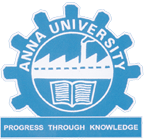 ANNA UNIVERSITY CHENNAI:: CHENNAI 600 025
ANNA UNIVERSITY CHENNAI:: CHENNAI 600 025
CURRICULUM 2004
B.TECH. INFORMATION TECHNOLOGY
SEMESTER IV
IT1252 DIGITAL SIGNAL PROCESSING
AIM
To review signals and systems, study DFT and FFT, discuss the design of IIR & FIR filters and study typical applications of digital signal processing.
OBJECTIVES
• To have an overview of signals and systems.
• To study DFT & FFT
• To study the design of IIR filters.
• To study the design of FIR filters.
• To study the effect of finite word lengths & applications of DSP
UNIT I SIGNALS AND SYSTEMS 9
Basic elements of digital signal Processing –Concept of frequency in continuous time and discrete time signals – Sampling theorem –Discrete time signals. Discrete time systems – Analysis of Linear time invariant systems –Z transform –Convolution and correlation.
UNIT II FAST FOURIER TRANSFORMS 9
Introduction to DFT – Efficient computation of DFT Properties of DFT – FFT algorithms – Radix-2 and Radix-4 FFT algorithms – Decimation in Time – Decimation in Frequency algorithms –Use of FFT algorithms in Linear Filtering and correlation.
UNIT III IIR FILTER DESIGN 9
Structure of IIR – System Design of Discrete time IIR filter from continuous time filter – IIR filter design by Impulse Invariance. Bilinear transformation – Approximation derivatives – Design of IIR filter in the Frequency domain.
UNIT IV FIR FILTER DESIGN 9
Symmetric & Antisymteric FIR filters – Linear phase filter – Windowing technique – Rectangular, Kaiser windows – Frequency sampling techniques – Structure for FIR systems.
UNIT V FINITE WORD LENGTH EFFECTS 9
Quantization noise – derivation for quantization noise power – Fixed point and binary floating point number representation – comparison – over flow error – truncation error – co-efficient quantization error - limit cycle oscillation – signal scaling – analytical model of sample and hold operations – Application of DSP – Model of Speech Wave Form – Vocoder.
TUTORIAL 15
TOTAL : 60
TEXT BOOK
1. John G Proakis and Dimtris G Manolakis, “Digital Signal Processing Principles, Algorithms and Application”, PHI/Pearson Education, 2000, 3rd Edition.
REFERENCES
1. Alan V Oppenheim, Ronald W Schafer and John R Buck, “Discrete Time Signal Processing”, PHI/Pearson Education, 2000, 2nd Edition.
2. Johny R.Johnson, “Introduction to Digital Signal Processing”, Prentice Hall of India/Pearson Education, 2002.
3. Sanjit K.Mitra, “Digital Signal Processing: A Computer – Based Approach”, Tata McGraw-Hill, 2001, Second Edition.

0 comments:
Post a Comment